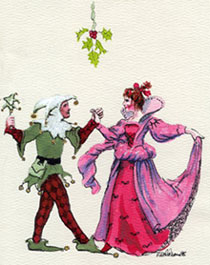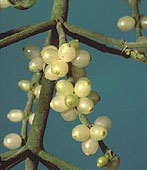为什么站在槲寄生下就可以接吻?
[ 2006-10-20 11:33 ]
“北欧神话中,和平之神Balder被邪恶之神Loki以槲寄生所制成的箭射死,Balder的母亲——爱神Freya得知后痛不欲生,和众神想尽办法挽救Balder的生命,终于将他救活。Freya非常感激,因此承诺无论谁站在槲寄生下,便赐给那个人一个亲吻……”
传说在槲寄生下亲吻的情侣,会厮守到永远。
 Since ancient times, the mistletoe has been one of the most magical,
mysterious and sacred plants of European folklore. Since ancient times, the mistletoe has been one of the most magical,
mysterious and sacred plants of European folklore.
The ancient Druids considered the
mistletoe to be a sacred plant and believed it had miraculous powers which could
cure illnesses, serve as an antidote
against poisons, ensure fertility and protect against the ill
effects of witchcraft. It was also believed that the mistletoe was an
aphrodisiac or a sexual symbol.
From these strange beliefs has come the modern-day custom of hanging a ball
of mistletoe from the ceiling and exchanging kisses under it as a sign of
friendship and goodwill.
The tradition of smooching under
the mistletoe descends from the customs of several different cultures. For
instance, exchanging kisses under the mistletoe was a tradition of Greek
festivals and marital ceremonies. If a couple in love exchanges a kiss under the
mistletoe, it is interpreted as a promise to marry, as well as a prediction of
happiness and long life.
 The Anglo-Saxons associated the powers of the
mistletoe to the legend of Freya, the goddess of love, beauty and fertility.
According to the legend, a man had to kiss any young girl who, without realizing
it, found herself accidentally under a sprig of mistletoe hanging from the
ceiling. Guys would pluck a berry when they smooched the girls and when the last
berry was gone, there would be no more kissing! The Anglo-Saxons associated the powers of the
mistletoe to the legend of Freya, the goddess of love, beauty and fertility.
According to the legend, a man had to kiss any young girl who, without realizing
it, found herself accidentally under a sprig of mistletoe hanging from the
ceiling. Guys would pluck a berry when they smooched the girls and when the last
berry was gone, there would be no more kissing!
In France, the custom linked to the mistletoe was reserved for New Year's
Day: "Au gui l'An neuf"--Mistletoe for the New Year.
Today, kisses can be exchanged under the mistletoe any time during the
holiday season.
mistletoe: 槲寄生
Druid: 德鲁伊教团员
antidote: 解毒剂
aphrodisiac: 能引起性欲的
smooching: 接吻
(英语点津 Annabel 编辑) |